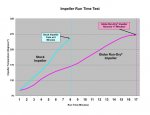calvinyonce
Cadet
- Joined
- May 28, 2012
- Messages
- 12
We have a lot of different types of outboard motors at my job and when I arrived it was common practice to crank the motor on the trailer out of water before leaving the office to make sure it will crank when we reach the river. I was always told by my outboard mechanics that this is a very bad because the impeller can either break off one of the rungs or wear on the ends where the impeller touches the water pump housing. The good folks at work say they have never had any problems with this but they replace the water pump impellers yearly anyway due to the nature of the water we run the motors in. They also have said that there should still be some water in the housing from the previous usage, which I don't think is correct. The Missouri river has a lot of silt suspended in the water and they are saying it wears the impellers down enough that dry starting them wont matter. To my understanding even if the impeller does not essentially break off or be damaged so much it doesn't work at all even wearing it a little could cause poor pumping of the cooling system and thus causing prolonged damage to the power head and other parts of the motor. What would everyone's recommendation be here. Any insight into cranking outboards dry would be much appreciated. One of my coworkers even suggested that you can run the motor dry for 20 seconds with no problems, I am positive that would lead to a variety of problems.




















